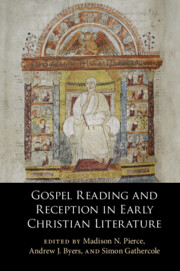Book contents
- Gospel Reading and Reception in Early Christian Literature
- Gospel Reading and Reception in Early Christian Literature
- Copyright page
- Dedication
- Contents
- Contributors
- Foreword: We Are All Gospel Readers
- Introduction
- Part I Reading the Gospel in Israel’s Scriptures
- 1 Reading the Old Testament Christologically
- 2 Where Is the “God of Israel” in Paul’s Reading of the Gospel?
- 3 Gospel Reading and Prosopological Exegesis in Luke-Acts
- Part II Gospel Writers as Gospel Readers
- Part III Gospel Reading as Ecclesial Tradition
- Bibliography
- Index of Ancient Sources
- Index of Modern Authors
- Index of Subjects
3 - Gospel Reading and Prosopological Exegesis in Luke-Acts
from Part I - Reading the Gospel in Israel’s Scriptures
Published online by Cambridge University Press: 27 January 2022
- Gospel Reading and Reception in Early Christian Literature
- Gospel Reading and Reception in Early Christian Literature
- Copyright page
- Dedication
- Contents
- Contributors
- Foreword: We Are All Gospel Readers
- Introduction
- Part I Reading the Gospel in Israel’s Scriptures
- 1 Reading the Old Testament Christologically
- 2 Where Is the “God of Israel” in Paul’s Reading of the Gospel?
- 3 Gospel Reading and Prosopological Exegesis in Luke-Acts
- Part II Gospel Writers as Gospel Readers
- Part III Gospel Reading as Ecclesial Tradition
- Bibliography
- Index of Ancient Sources
- Index of Modern Authors
- Index of Subjects
Summary
In Luke and Acts, many quotations from Scripture are recontextualized to portray Jesus as a character within the discourse. He is the one who will bring good news to the poor (Isa. 61:1–2 in Luke 4:18–21), the Messiah who escapes death (Ps. 16:8–11 in Acts 2:25–32), the suffering servant (Isa. 53 in Acts 8), and more. Jesus and later his disciples attest to “what was said in all the Scriptures concerning [him]” (Luke 24:27). This essay will present these gospel readings, which employ the exegetical technique commonly referred to as prosopological exegesis, alongside the assumptions of the author. While many present Luke as a capricious reader, this essay will demonstrate that his introduction of the Christ is due to a careful engagement with the biblical text. This interpretive strategy produces two gospel readings: one for Luke of Scripture and one for Luke’s audience.
Keywords
- Type
- Chapter
- Information
- Publisher: Cambridge University PressPrint publication year: 2022

